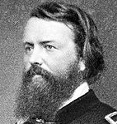|
bewbies posted:The issue of officer recruitment/training in conscript armies really hasn't ever been satisfactorily solved, I don't think at least. It was worse during the 19th century and the ACW in particular because a lot of times your position as a regiment commander was by virtue of your status in the community and or your ability to pay for the regiment. So how were officers selected during the American civil war? Was a Harvard divinity degree enough or was there some requirement for practical experience? American officers weren't buying their own men uniforms were they?
|
|
|
|

|
| # ? May 23, 2024 20:39 |
Squalid posted:So how were officers selected during the American civil war? Was a Harvard divinity degree enough or was there some requirement for practical experience? American officers weren't buying their own men uniforms were they? Some of the volunteers at the start were, oh what a wonderous military fashion show that is to behold.
|
|
|
|
|
SeanBeansShako posted:Some of the volunteers at the start were, oh what a wonderous military fashion show that is to behold. https://en.wikipedia.org/wiki/Zouave#Zouaves_of_the_American_Civil_War Oh yes they were. Also I love how the 5th New York was a bunch of military enthusiasts and actually fought really well.
|
|
|
|
xthetenth posted:https://en.wikipedia.org/wiki/Zouave#Zouaves_of_the_American_Civil_War And by military enthusiasts you mean- people posting in this thread? 
|
|
|
|
SeanBeansShako posted:Am I the only one who things Little Mac to be perhaps the most adorable nickname a soldier can give to his commander now? "Little Boots" and "Short-cape" also come to mind. Caligula and Caracalla in the original Latin.
|
|
|
|
Nebakenezzer posted:And by military enthusiasts you mean- people posting in this thread?
|
|
|
|
darthbob88 posted:I remember seeing, admittedly in a Cracked article,. People, don't use Cracked to develop your opinions of history. edit: Also all sorts of ACW generals were goony as gently caress. Christ, if Jackson wasn't on the spectrum I don't know who is.
|
|
|
|
Cyrano4747 posted:People, don't use Cracked to develop your opinions of history. slim decent looking (under the beard) in a loving relationship with a real human woman likes Mexicans and the Mexican culture the definition of goon is you're a geek and also a complete social fuckup
|
|
|
|
SeanBeansShako posted:Am I the only one who things Little Mac to be perhaps the most adorable nickname a soldier can give to his commander now? 
|
|
|
|
HEY GAL posted:he's a sperg but he's not a goon. observe: Oh come on, three of four of those aren't necessary conditions of goondom.
|
|
|
|
So I'm in Ottawa for the Society for Military History's annual conference. Last night at the Canadian War Museum I drank about seventeen glasses of free wine (thanks to the government of Australia) and spent what seemed like four hours yammering about my research to a naval officer who wrote a book I read last year. Also because there was a Sherman and a Panther on display next to each other, I got to point and say "there's the most overrated tank of the war next to the most underrated one".
|
|
|
|
ALL-PRO SEXMAN posted:Also because there was a Sherman and a Panther on display next to each other, I got to point and say "there's the most overrated tank of the war next to the most underrated one". 
|
|
|
|
HEY GAL posted:he's a sperg but he's not a goon. observe: Hey thanks 
|
|
|
|
ALL-PRO SEXMAN posted:So I'm in Ottawa for the Society for Military History's annual conference. Last night at the Canadian War Museum I drank about seventeen glasses of free wine (thanks to the government of Australia) and spent what seemed like four hours yammering about my research to a naval officer who wrote a book I read last year. Go to a Spuds Poutinerie if you want really good poutine. Visit the Aerospace museum in Rockliffe.
|
|
|
|
HEY GAL posted:he's a sperg but he's not a goon. observe: He was hated by his students at VMI and tried to have one expelled when he played a prank on Jackson. Sounds like a d&d poster.
|
|
|
|
So, like, what was the rationale behind exiling Napoleon to Elba? Even ignoring our hindsight knowledge that he'll just come back in the hundred days, giving a defeated and deposed ruler an island to be king of just seems like such a weird thing to do?
|
|
|
Empress Theonora posted:So, like, what was the rationale behind exiling Napoleon to Elba? Even ignoring our hindsight knowledge that he'll just come back in the hundred days, giving a defeated and deposed ruler an island to be king of just seems like such a weird thing to do? They really don't like killing heads of state: sets a bad precedent to what could happen to them if they lose. But you obviously can't let Napolean just walk around France or stick him in a mainland prison he could be easily rescued.
|
|
|
|
|
Empress Theonora posted:So, like, what was the rationale behind exiling Napoleon to Elba? Even ignoring our hindsight knowledge that he'll just come back in the hundred days, giving a defeated and deposed ruler an island to be king of just seems like such a weird thing to do? He may have been an upstart, but he was still crowned by the Pope and if the Coalition had killed him like a common criminal they'd be no better than the Jacobins.
|
|
|
|
bewbies posted:I will say that while The Civil War is probably my favorite TV show of all time one of the main criticisms I have of it was its treatment of McClellan....he wasn't great by any means, but he wasn't quite the complete idiot that he's portrayed as in that series. It's been a while since I watched it, but Burns relied on people's letters to give them voice and personality. McClellan's correspondence makes him look really bad, especially because we have a lot of private letters to his wife that contain a really remarkable stream of total bullshit. Those are the letters where he talks about, for example, having to resist the blandishments of supporters who are urging him to march on Washington to depose Lincoln and make himself dictator. McClellan was also very political and he sparred with a lot of other key figures in the Union, so you also get a lot of primary material about what an rear end in a top hat he is. Meanwhile McClellan's most important accomplishments, like being the architect of the Army of the Potomac and laying the groundwork for the whole Eastern Theatre of the war, are something that you have to lean a lot more on secondary literature to establish.
|
|
|
|
Empress Theonora posted:So, like, what was the rationale behind exiling Napoleon to Elba? Even ignoring our hindsight knowledge that he'll just come back in the hundred days, giving a defeated and deposed ruler an island to be king of just seems like such a weird thing to do? Everyone else basically laid the reasons out. Executing heads of state was/is a pretty big no-no. It led to an amazing little part of human history. Napoleon ruled the independent Principality of Elba. He was allowed a slightly under-strength battalion and even at least a revenue cutter or two. He also had complete control over the government, and spent a lot of his time refining the legal system of the island and reforming its economy and society. He also designed the flag that is in use today. You can see his house in Portoferraio, it is pretty neat. About an hour and a half ferry from Piombino on the mainland. The island is interesting and has extensive history to pre-Etruscan times due to the iron ore deposits.
|
|
|
|
You also have to compare him to other commanding generals of the Army of the Potomac, in that he never really had a fuckup like most of his contemporaries. This was partially due to his complete avoidance of risk, but the retreat after the Peninsular Campaign could have been disastrous, but he managed to extract the army more or less intact. As well as that, Antietam wasn't the crushing victory that could have occurred if he had been slightly more adventurous, but it wasn't a crushing defeat either and was seen in the North as a victory, or enough of a victory that Lincoln released the Emancipation Proclamation. Comparisons to other commanding Generals are generally favourable to McClellan: McDowell left the Army of the Potomac in shambles after 1st Bull Run, Pope lost badly at 2nd Bull Run, Burnside basically sent the army to die at Fredericksburg, Hooker also lost big at Chancellorsville. I don't think McClellan was a stellar General, but he did set the ground work for the Army of the Potomac that allowed it to face defeat after defeat and still be able to continue fighting.
|
|
|
|
Tekopo posted:You also have to compare him to other commanding generals of the Army of the Potomac, in that he never really had a fuckup like most of his contemporaries. This was partially due to his complete avoidance of risk, but the retreat after the Peninsular Campaign could have been disastrous, but he managed to extract the army more or less intact. As well as that, Antietam wasn't the crushing victory that could have occurred if he had been slightly more adventurous, but it wasn't a crushing defeat either and was seen in the North as a victory, or enough of a victory that Lincoln released the Emancipation Proclamation. I'm continuing to watch "The Civil War" and this is my conclusion, too. Like Hey Gal said, McCellan was the guy you wanted in charge of training and logistics - he wasn't the guy you wanted commanding in the field. I can't comment too much on Burnside and Hooker, but both come off as hapless in the face of a smart opponent.
|
|
|
|
I'm pretty anti-McClellan. The retreat in the Peninsular campaign was completely unnecessary; he was falling back after his subordinates' tactical wins. Other armies were formed just fine without his supposed magic touch, and none of them were as politically touchy. A successful McClellan wanted to become dictator, and an unsuccessful one lets the country be split. There was no good outcome with him. I will admit he wasn't the least competent army commander. That would probably be Burnside. I'm a little sympathetic to Pope. You can make a decent case that he was ok, but sabotaged by his subordinates.
|
|
|
|
I wouldn't call myself really a Pro-McClellan person and I agree that retreat in the Peninsula campaign was completely unnecessary and based on fears of overwhelming numbers of Confederates that weren't actually present, but considering the situation that the Army was in, the historical events aren't the worst case scenario of how the retreat (no matter how stupid) could have ended. As well as that, the state of the army after 1st Bull Run was pretty dire, and there are many accounts of how fond the soldiers of the Army of the Potomac were of Little Mac. That's not to say that someone else couldn't have shaped the Army correctly, but if he did anything right, it was at least that. McClellan certainly lengthened the war though, both by his unwillingness to attack and his various political attacks towards the Union.
|
|
|
|
That's what's maddening about McClellan: he had the talent to be really, really good. There's a long quote from Sherman about how he's a better general than Grant at virtually everything you can imagine, except he's afraid of the enemy and Grant isn't. It's the same thing with McClellan, only twice as much.
|
|
|
|
xthetenth posted:https://en.wikipedia.org/wiki/Zouave#Zouaves_of_the_American_Civil_War Dammit, I wandered through that Wikipedia article and this caught my eye: https://en.wikipedia.org/wiki/Zouaves_of_Death Now I can't help but imagine corpse-painted troops with enormous spiked bracers, screaming unintelligibly as they march to battle.
|
|
|
|
BurningStone posted:That's what's maddening about McClellan: he had the talent to be really, really good. There's a long quote from Sherman about how he's a better general than Grant at virtually everything you can imagine, except he's afraid of the enemy and Grant isn't. It's the same thing with McClellan, only twice as much. Exactly sums up McClellan in my view. If he had been able to use the Army of the Potomac as well as he had organized and trained it, we would talk about him and not Grant today. But he did set that army up for the eventual showdown in Virginia once Grant had command.
|
|
|
KYOON GRIFFEY JR posted:Everyone else basically laid the reasons out. Executing heads of state was/is a pretty big no-no. It led to an amazing little part of human history. Napoleon ruled the independent Principality of Elba. He was allowed a slightly under-strength battalion and even at least a revenue cutter or two. He also had complete control over the government, and spent a lot of his time refining the legal system of the island and reforming its economy and society. He also designed the flag that is in use today. And this was a thing Napoleon did through his whole life, not just a one off bored exile. The man was quite possibly the ultimate micro manager. I mean, can you organise the logistics of an army of Revolutionary France, set up an independent Italian nation state from scratch AND have the time manage family affairs now? No wonder the dude burned out died barely in his forties.
|
|
|
|
|
100 Years Ago: Reading And Enjoying, For The Use Of Two problems for Edward Mousley, on the 11th of April. One is that they've just had their rations cut right to the bone in response to General Lake's latest progress report. The other is that Cockie is unhappy with him. Guess what gets more attention in his diary? Meanwhile: the German government has a crack at getting into the Guinness Book of Records for "Most Unconvincing Lie in Diplomatic History"; the Serbian Army is now ready to begin returning to Greece; Grigoris Balakian is still trying to make the best of a bad job; Corporal Louis Barthas, for such he is again, has won the day and seriously embarrassed his officers; Robert Pelissier is inspected by yet more Important Personages; Maximilian Mugge gets caught up in that nasty south-coast measles epidemic; and Malcolm White becomes very probably the first and only man ever to describe war itself as "a star-spangled old wizard". Not like a star-spangled old wizard, mind you. This is direct metaphor, not abstruse simile.
|
|
|
|
SeanBeansShako posted:The man was quite possibly the ultimate micro manager.
|
|
|
|
HEY GAL posted:hey. Napoleon and Wallenstein each coach a little league team who wins
|
|
|
|
Thalantos posted:lol, oh, I know! I had an M-4 when I deployed. Considering how cramped humvees can get, i was glad for any kit that was smaller. you're the guy who doesn't saw off the bottom three feet of his pike
|
|
|
|
ArchangeI posted:Napoleon and Wallenstein each coach a little league team I'd watch this sitcom
|
|
|
|
Whispers from Winchester George’s autobiography follows a pretty simple structure. It’s cyclical (in the best possible way), but his time in the Scrubs is the focus. It’s what he sees his life as leading up to, and afterwards considers it the proving ground of his objection. Once he’s passed the Scrubs he knows that nothing will be that hard again. His first sentence over, but with no end to the war in sight, his second will not necessarily be his last - but nothing could be as bad as the crippling lonliness and isolation of the Scrubs when he thought it would be a triumphant story of man triumphing over system. His experience in Winchester prison would have been very similar. The same rules, the same isolation and the same food - but George’s recollection is very different. What took up four chapters in Wormwood Scrubs becomes one in Winchester, giving his experiences there a light and even cheeky tone. He doesn’t recount the hardship, merely the differences - and so it’s tempting to make this second sentence sound positive. But he has another year of hard labour on a starvation diet, and he will be lonely, if not as depressed. Anyway! On to Winchester. It’s a much less intimidating place than the Scrubs, and a rose garden flanks the path up to the door, enough that it “might as well have been the wicket gate leading to a quiet country church”. Added onto it’s look is that three months earlier, pro-CO MPs in the Commons had successfully pressured the government into significant concessions for men facing their second and subsequent sentences. Instead of immediate transfer to the first division with it’s absolute isolation, a CO will now be placed straight into the second. The silent shuffling exercise has been replaced with an hour of walking exercise where - gasp - COs can partner up and talk quietly to each other for an hour every day. He also gets a second (non-bible) book, and is sent the Oxford Book of English Verse from home, a new permanent and quaintly patriotic cell-mate. It’s the talking exercise that he particularly enjoys. It’s a volatile mix of socialists, communists, religious radicals and theologians, and George enjoys the opportunity to enter into quiet but heated debate day in day out, with “minds so rich and varied”. He makes the “impossible attempt at a psychological synthesis of those minds in bulk”, which is something that as a historian of these brave, stubborn, contrary and downright irritating men I can sympathise with. He doesn’t name them, but I think with a little digging I could work them out. The rogues gallery of his friends includes: “W”, a “London Gallio who was good to look at with his great tawny red beard”. He’s a Marxist who “for comradeship’s sake restrained his intense scorn of humpty-dumpty [Religion] and all things pertaining to humpty-dumpty, which provided me with constant diversion” “C”, almost certainly Charles John Cobb, “of the psychologically interesting extreme evangelical type which can walk up Ludgate hill and see the flat topped houses of Jerusalem on either side... Such men live and breathe in the 20th century but have their being in the first.... It [Cobb’s faith] is monstrous and apocalyptical no less than beautiful and terrible” “When I saw him last, his face was the face of a saint who had finished with earth and earth’s desperate evil” Cobb will later die when the prison authorities discharge him in February 1919 so that he doesn’t die on their premises. He suffered throughout the war with TB, but was given no treatment after a 1916 diagnosis. His wife and child were left destitute, and he was buried in an unmarked paupers grave, but in 1999 a campaign in his native Croydon got a street named after him, and a marble headstone marked with “I fear God, not man”, a statement I’m sure George would have agreed described him. “S”, “God looked out of this man’s eyes also. S called God Marx and gave his gospel the clumsy and unaesthetic name of “the materialist conception of history”. He interested me as much, but no more than, C” George Baker, everybody, the archetypical “Socialist: Unattatched” The two men that will do much to not only keep George sane but eventually make him kind-of-historically-famous were Alan McDougall and Alfred Corum. George, in that manly agape spirit of the CO says: “I loved these two for themselves and for their Gallio reaction to the War and the pacifist stand for peace. They cared neither primarily for the war, not the pacifist stand against it. They cared for things more excellent, which war destroyed; the one for the loveliness of letters, the other for the miracle of music” (Alfred Corum (Socialist, Atheist, Musician), has a problem, his recently married wife is sending him red-hot letters that “help him to endure his prison life and made it harder to be endured”. George turns to him for manly advice on “women, brides and wives” but shys away from writing down the answers he received.) But the reason that George likes these two so much comes from their output - the Winchester Whisperer. A 100% illegal, very covert “newspaper”, Alfred and Alan edit it, gathering submissions written on sheets of toilet paper and using needles, pencil scraps and ink made from book cover dye and water, stitching them together and binding them in sackcloth. Every issue is a masterpiece, filled with illustrations, jokes, poems, stories, chess problems, fake advertisements and more. It’s passed round from CO to CO and kept hidden, published fortnightly “after each pencil search”. I could talk a LOT about the whisperer, but it’s been on the TV a few times. So, check out these: http://www.bbc.co.uk/news/uk-england-25749290 http://www.bbc.co.uk/programmes/p01t20y7 (the best thing about the whisperer is that it's largely been known from a single copy - which is in Friends House Library in London. A second copy has recently been unearthed. By me. It is all very exciting, and should be published properly soon. I can't, sadly, break publication embargo on my own work with it, but it's a pretty nice piece. And here's a page from the copy that has recently emerged:  But George has a very special place in CO history, because the Whisperer is neccessarily an anonymous paper. Aside from the editorial - Alan McDougall - and Alfred Corum’s submissions, writing as “Nemo”, George is the only other writer we can identify. And it’s because he wrote so much about his creative process. I’ll let him take over: “the Winchester Whisperer was, with the exception of Alan McDougall’s contributions, great tripe. it was also great fun. To it I contributed various love lyrics with the little brown slip of a girl as subject, and various equally sentimental songs of Sussex and the sea: poor stuff all of it.” And, sorry George mate, it really is. I’ve only identified one of his poems so far, as access to the surviving copies of the Whisperer is poor at best, but it goes like this: To You (the not-impossible She). Earliest in my recollection Mother’s face is; Sussex, next, won my affection With her graces; Last into my life you entered, Then Homes’ essence And my mother’s love, seemed centred In your presence Would, dear heart, that I could bring you Gifts of splendour! Since I can not, let me sing you Love songs tender: Yours are curves that Sussex lovers Prize their Downs for. Eyes like your and like my mother’s God made browns for. -------- Christ on a crutch, George Baker has to be the worst poet in the world. And he knows it! Which I absolutely adore him for. Undaunted by this early poetic effort, he “At a later stage I took it upon myself to be the interpreter in verse of socialism to our more Humpty-Dumptian comrades. Still later I tried to be the apologist of my Rabelaisian dock worker Fat Fred, this particularly to address the considerable section of Winchester pacifists who were christian, socially of the middle class.” An example of this that HAS to be Baker comes from the only other copy of the Winchester Whisperer that has survived to the present day: “You little bugger, catch this fuckin plum! You shudder, priest and horror leaves you dumb Your levites creed that manners makes the man ignores the foul mouthed Good samaritan” George then notices that one of the wings of the prison is home to female prisoners - “I wrote more angry verse in language more indecent than any I had written before. Before I was released from Winchester I was, I imagine the most prayed for man in it’s gaol. The prayers were well meant but unneccessary, my indecent verse was but the very young outpouring of a very young man at war with the barbarity of prison life and the leviticism of some of the good men who shared it with them” The upshot of all this is that George feels relatively at peace with the world while at Winchester, and George develops his own branch of theism, a Bakerism that involves a blind and stupid God that is to be pitied. The idea goes down like a lead balloon when he tries to spread it around the prison. While all this is happening, the world turns and soon it’s November 1918, the Armistice is signed - but nothing changes in prison. Christmas, the same. It’s only in March, with Charles Cobb’s death that prison routine changes. The COs, incensed by the treatment Cobb received, refuse all cooperation with the prison authorities - Alfred and Alan go on hunger strike and are released, and finally, after a month of total resistance, so is George. His 24th birthday has passed unnoticed, but on April 8th, he is told he is a free man. Not just released from prison, but officially (and totally) discharged from the Army. He returns home in the company of military police, and receives his discharge papers. On them is stamped a grim warning - attempting to enlist without informing the Army of the dishonourable discharge he had received would be met with severe penalties: two years in prison. "What a perfect final irony from the Old Men of Europe!" It has been: “an unforgettable journey, that journey from Winchester to East Blatchington... The fields of Hampshire seemed like the fields of Heaven, while Sussex, my native Sussex was paradise itself. “A man must be born again” - how often had those admirable, those wretched, Brethren hurled that phrase at me! That day I had been born again, born into freedom. That was it! I was free! I was Free! I was FREE! So I told myself, ignorant of the purblind pranks which Fate can play” lenoon fucked around with this message at 21:23 on Apr 15, 2016 |
|
|
Ainsley McTree posted:I'd watch this sitcom The episode where Napoleon swaps places with bumbling elder brother who sells the hotdogs is a laugh riot.
|
|
|
|
|
ArchangeI posted:Napoleon and Wallenstein each coach a little league team All of Napoleon's team gets killed trying to steal Wallenstein's team's mascot, but then Wallenstein gets assassinated and the league gets suspended.
|
|
|
|
SeanBeansShako posted:The episode where Napoleon swaps places with bumbling elder brother who sells the hotdogs is a laugh riot.
|
|
|
lenoon posted:Whispers from Winchester A nice end to George's tale, but can you do a quick summary of what he did after he returned? I doubt any of it is interesting but I'd like to know what George got up to.
|
|
|
|
|
SeanBeansShako posted:The episode where Napoleon swaps places with bumbling elder brother who sells the hotdogs is a laugh riot. I prefer the very special episode where someone dies, forcing them to learn the true meaning of friendship
|
|
|
|

|
| # ? May 23, 2024 20:39 |
|
nothing to seehere posted:A nice end to George's tale, but can you do a quick summary of what he did after he returned? I doubt any of it is interesting but I'd like to know what George got up to. It's not over yet! The "purblind prank that fate could play" is sad indeed.
|
|
|








































